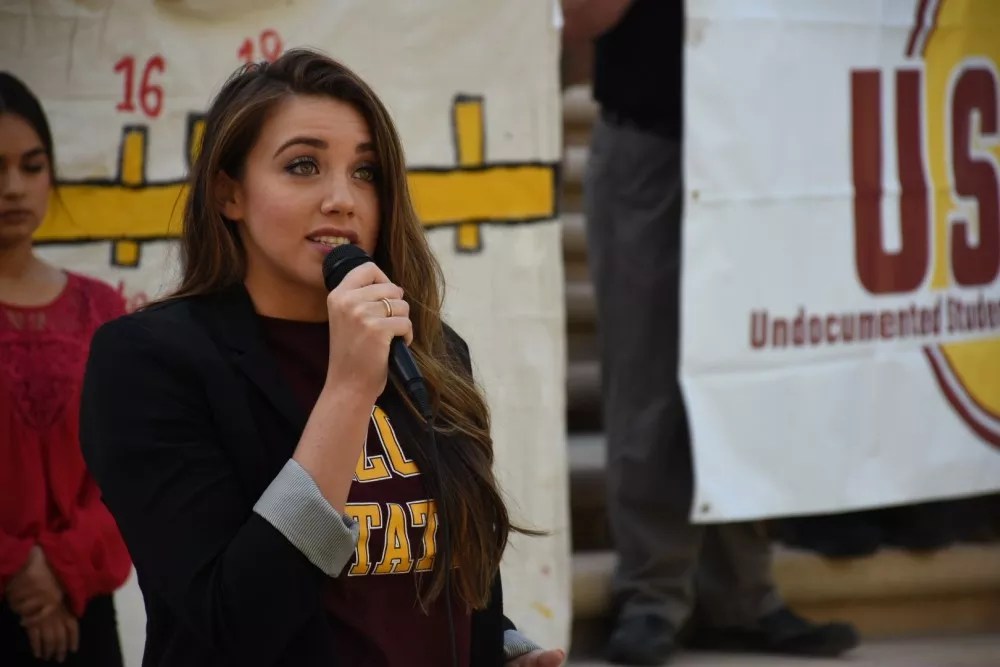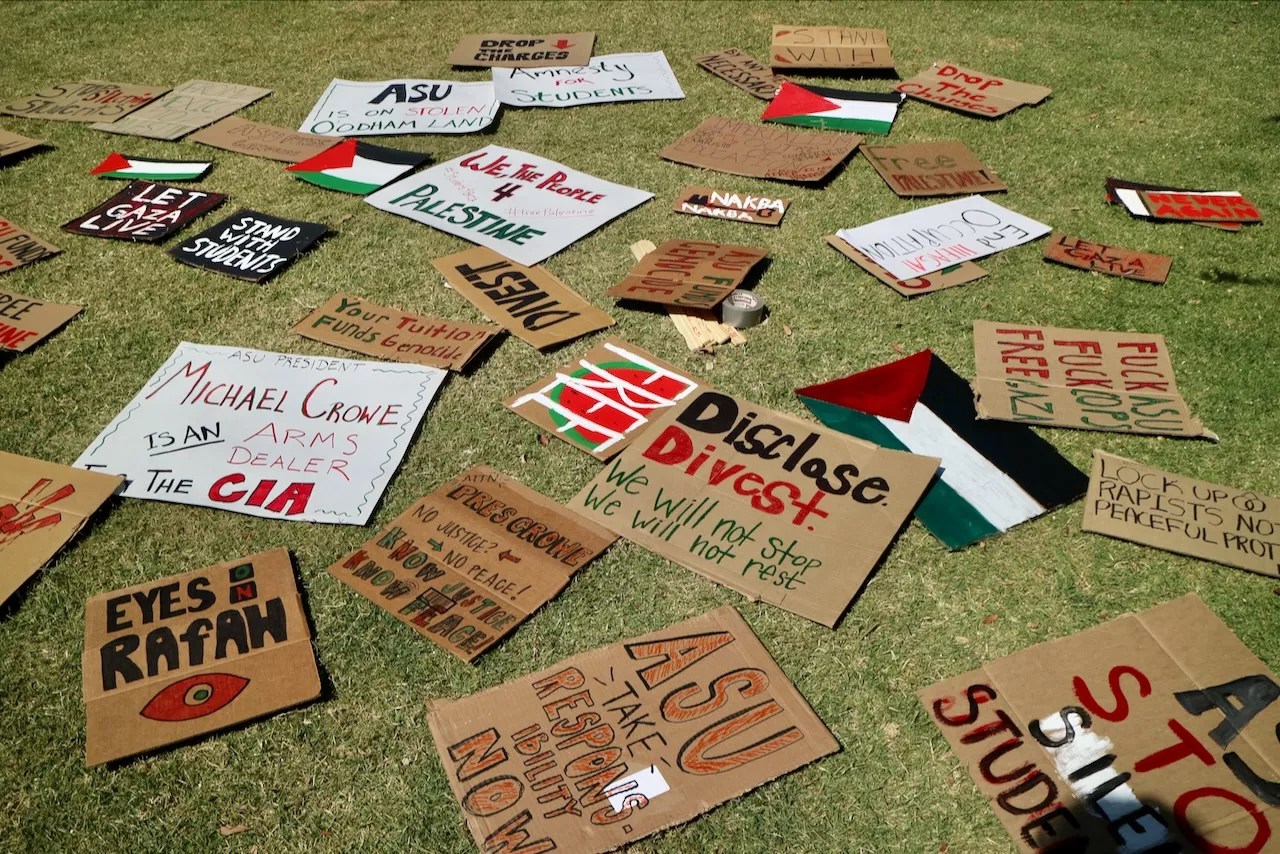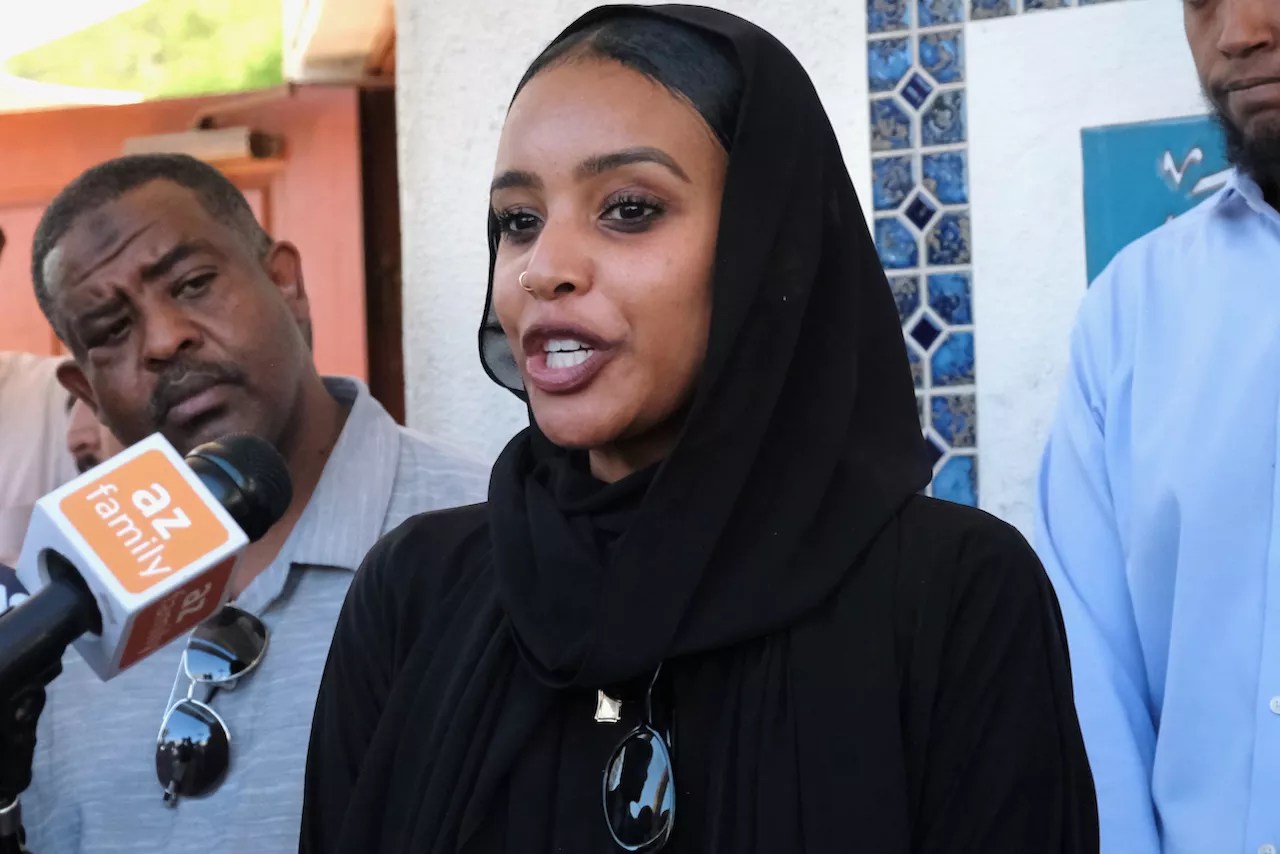
Courtesy of Belén Sisa

Audio By Carbonatix
Last weekend, U.S. immigration authorities disappeared a legal permanent resident because they didn’t like his views on Israel’s war in Gaza.
The arrest of Mahmoud Khalil, a student activist who participated in pro-Palestine protests at Columbia University, has generated a national outcry. Khalil is a green card holder with legal status and has not been charged with a crime. The Department of Homeland Security cited his involvement in the protests and accused him of leading “activities aligned to Hamas, a designated terrorist organization.” After his arrest, Secretary of State Marco Rubio said, “We will be revoking the visas and/or green cards of Hamas supporters in America so they can be deported.”
It’s a naked attempt to justify a clear violation of the First Amendment, which bars the government from policing speech – from citizens or anyone else in the country – that it doesn’t like. And though it happened on the other side of the country, it hit home for Arizona resident Belén Sisa.
“That could have been me,” Sisa said. “His arrest is a showing of ‘You better shut up, or this could happen to you.'”
Now 31, Sisa came to the U.S. from Argentina when she was six. She’s lived in Arizona ever since, protected from deportation by the Deferred Action for Early Arrivals program. She’s also politically outspoken – since 2015, she’s made headlines for advocating for DACA recipients and undocumented immigrants and for leading Arizona’s uncommitted movement protesting Israel’s war in Gaza.
The First Amendment protects that speech, but Sisa isn’t feeling so protected these days. DACA status isn’t as ironclad as having a green card, which Khalil’s arrest suggests isn’t all that bulletproof in the first place. If President Donald Trump is intent on rooting out undesirables, defined essentially by viewpoints he dislikes, Sisa’s immigration status and outspokenness paint a target.
“It gives me anxiety,” said Sisa, an Arizona State University alumnus. “DACA is a temporary program. Tomorrow I could not have a work permit anymore and be prone to be deported.”

Signs at Arizona State University’s Tempe campus after an April protest of Israel’s mass killing of civilians, women and children in Gaza.
TJ L’Heureux
Targeting ASU
There is evidence that the Trump administration has ASU in its crosshairs. Trump has targeted universities as well as Khalil, yanking $400 million in grants from Columbia over its supposed failure to combat antisemitism on campus. Since Khalil’s arrest, the U.S. Department of Education announced it would be investigating 60 universities for failure to combat antisemitism on campus – including ASU.
ASU’s inclusion on that list appears particularly shambolic. Jewish groups at ASU have pushed back on the notion that the school is a wellspring of anti-Jewish hate, and ASU spokesperson Jerry Gonzales wrote that “Arizona State University has a long history of opposing antisemitic rhetoric and acts of intimidation whether they occur on our campuses or in the community.” If anything, the school has been more hostile to pro-Palestine views.
When pro-Palestine protesters set up an encampment in front of Old Main on ASU’s Tempe campus in April 2024, the University quickly shut it down. Then-ASU Police Chief Michael Thompson was caught on camera destroying protesters’ tents with a knife while other cops forcibly removed the hijabs of several Muslim women. Roughly 70 protesters were arrested, many of whom were suspended and now face misdemeanor criminal trespassing charges. Several of them filed a First Amendment lawsuit against the university, which is still ongoing.
So while ASU may have pushed back against the idea that it had turned a blind eye to antisemitism, pro-Palestine advocates aren’t holding their breath that the school will stand up for the free speech rights of students who criticize Israel. ASU declined to respond to questions about the First Amendment implications of the Department of Education’s letter and whether it would act to protect students from deportation.
“ASU is at a crossroads,” said Azza Abuseif, the executive director of the Council on American-Islamic Relations Arizona. “It can either uphold its duty to protect students’ rights and academic freedom or allow fear and repression to take hold.”
The threat of losing federal funding has proved to be a powerful cudgel that no universities have meaningfully contested. While Democratic state attorneys general and nonprofits have filed lawsuits galore over the Trump administration’s many constitutional violations, American colleges seem to have been chilled into acquiescence as Trump attacks diversity programs and now campus speech.
“I’m sure that they’re very fearful about losing funds and resources,” said Sarah León, a community activist and ASU alum. “It’s this really gross fear tactic to strip the universities of resources and money and put them in a corner where they feel like they have no choice but to support this attack on First Amendment rights.”
Organizers want to see the ASU stand up to the Trump administration and assert that their students have the right to protest and that even unpopular views should be protected. But that hasn’t happened yet.
“Their job is to grow these students, to educate them, not to teach them cowardice and silence,” said Mohye Abdulaziz, the founder of Arizona Palestine Solidarity Alliance. “But unfortunately, most leaderships of the universities are the most concerned about the funding.”

Azza Abuseif, the executive director of the Arizona chapter of the Council on American-Islamic Relations.
Katya Schwenk
Chilling effect
If universities like ASU won’t willingly defend the First Amendment, immigrants like Sisa must weigh the dangers of continuing to exercise their rights to free speech. The New York Times reported that journalism faculty at Columbia advised non-citizen students to avoid writing about Israel and Gaza, noting that “Nobody can protect you” and that “These are dangerous times.”
Sisa feels that uncertainty. After Trump was reelected, she consulted an immigration lawyer about ways to obtain permanent legal status. An employer could sponsor her, but they’d have to prove no U.S. citizen could do her job. Her parents, now both U.S. citizens, could sponsor her, but that’d take nine to 10 years. She could marry a U.S. citizen, but her love life hasn’t gone in that direction. Even then, Khalil was married to a U.S. citizen and had permanent status, and that didn’t count for much.
If even permanent legal status isn’t a bulwark against arrest and deportation, it wouldn’t surprise activists if non-citizen students stifled their speech, scrubbed social media and tried to keep a lower profile. But Sisa figures she’s “in far too deep.” She won’t self-censor and “give them what they want.” She continues to speak out on social media against Trump’s overreaches.
On Tuesday, Sisa posted a photo of her U.S. Citizenship and Immigration Services account. As she checked on the status of her DACA renewal application, a “Making America Safe Again” pop-up appeared from the Department of Homeland Security to advise immigrants to self-deport.
“Follow the law and you will find opportunity. Break it and you will find consequences,” the site read. “DHS warns illegal aliens to self-deport or stay out.”
A chilling message, though Khalil’s arrest has put it in even starker terms: Be silent, or be silenced.